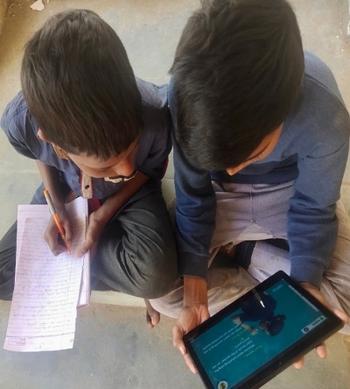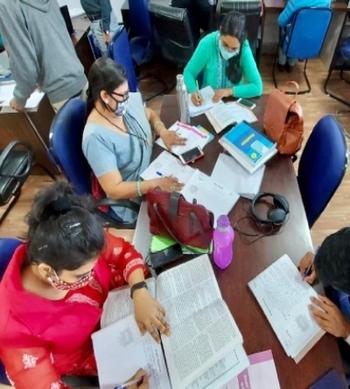CBSE Class 11 English Core Syllabus 2022-2023
The CBSE Class 11 English Core Syllabus for the academic year 2022-2023 is accessible here. This syllabus is useful for understanding the section-by-section details of topics to be prepared for the annual examination. Students can also learn about the mark breakdown and prepare for their exams accordingly. The syllabus also includes information about internal assessments. So, CBSE Class 11 students are advised to adhere to the most recent CBSE Class 11 English Core Syllabus in order to properly study for their exam and achieve good results. Please see and download the curriculum below.
Skip to
Download CBSE Class 11th English Syllabus
Download CBSE Class 11th English Literature Syllabus
Download CBSE Class 11th English Grammar
Section A - Reading Skills Reading
Comprehension through Unseen Passage (18 Marks)
I. One unseen passage to assess comprehension, interpretation inference and vocabulary. The passage may be factual, descriptive or literary.
II. One unseen case-based passage with verbal/visual inputs like statistical data, charts etc.
Note: The combined word limit for both the passages will be 600-750.Multiple Choice Questions / Objective Type Questions will be asked. (10+8 = 18 Marks)III. Note Making and Summarization based on a passage of approximately 200-250 words.
i. Note Making: 5 Marks
Title: 1 Mark
Numbering and indenting: 1 Mark
Key/glossary: 1 Mark
Notes: 2Marks
ii. Summary (up to 50 words): 3Marks
Content: 2
Expression: 1
Section B
IV. Grammar 7 - Marks
I. Questions on Gap filling (Tenses, Clauses)
ii. Questions on re-ordering/transformation of sentences (Total seven questions to be done out of the eight given).
V. Creative Writing Skills - 16 Marks
I. Short writing task – Classified Advertisements up to 50 words. One out of the two given questions to be answered (3 Marks: Format : 1 / Content : 1 / Expression : 1
ii. Short writing task –Poster up to 50 words. One out of the two given questions to be answered.(3marks:Format : 1 / Content : 1 / Expression : 1)
iii. Writing a Speech in 120-150 words based on verbal / visual cues related to some contemporary / age-appropriate topic.
iv. Writing a Debate based on visual/verbal inputs in 120-150 words. The theme should be contemporary topical issues. One out of the two given questions to be answered. (5 Marks: Format: 1 / Content: 2 / Expression: 2)
Section C
This section will have variety of assessment items including Multiple Choice Questions, Objective Type Questions, Short Answer Type Questions and Long Answer Type Questions to assess comprehension, analysis, interpretation and extrapolation beyond the text.VI. Reference to the Context I. One Poetry extract out of two from the book Hornbill to assess comprehension, interpretation, analysis and appreciation. (3x1=3 Marks)
ii. One Prose extract out of two from the book Hornbill to assess comprehension, interpretation, analysis and appreciation. (3x1=3 Marks)
iii. One prose extract out of two from the book Snapshots to assess comprehension, interpretation and analysis. (4x1=4 Marks)
VII. Two Short answer type question (one from Prose and one from Poetry from the book Hornbill), out of four, to be answered in 40-50 words. Questions should elicit inferential responsesthrough critical thinking. (3x2=6 Marks)
VIII. One Short answer type question, from the book Snapshots, to be answered in 40- 50 words. Questions should elicit inferential responses through critical thinking. Any 1 out of 2 questions to be done. (3x1=3 Marks)
IX. One Long answer type question, from Prose/Poetry Hornbill, to be answered in 120-150 words. Questions can be based on incident / theme / passage / extract / event as reference points to assess extrapolation beyond and across the text. The question will elicit analytical and evaluative response from student. Any 1 out of 2 questions to be done. (1x6=6 Marks)
X. One Long answer type question, based on the chapters from the book Snapshots to be answered in 120-150 words to assess global comprehension and extrapolation beyond the text. Questions to provide evaluative and analytical responses using incidents, events, themes as reference points. Any 1 out of 2 questions to be done. (1x6=6 Marks)Prescribed Books
1. Flamingo:
- The Last Lesson
- Lost Spring
- Deep Water
- The Rattrap
- Indigo
- Poets and Pancakes
- The Interview
- Going Places
(Poetry)
- My Mother at Sixty-Six
- Keeping Quiet
- A Thing of Beauty
- A Roadside Stand
- Aunt Jennifer’s Tigers
2. Vistas: Supplementary Reader published by National Council of Education Research and Training, New Delhi
- The Third Level
- The Tiger King
- Journey to the end of the Earth
- The Enemy
- On the Face of It
- Memories of Childhood
○ The Cutting of My Long Hair
○ We Too are Human Beings
Conclusion
In conclusion, the Class 11 English syllabus for CBSE Board offers a comprehensive approach to developing students' language skills and fostering their appreciation of literature. The syllabus is divided into two sections: English Core and English Elective.
FAQs
1.What is the difference between English Core and English Elective?
English Core is a compulsory subject for all students, focusing on building language skills and understanding literature through selected texts. English Elective, on the other hand, is an optional subject for students who choose to study English in more depth, exploring a wider range of literary works.
2.How should I prepare for the reading comprehension section?
To prepare for the reading comprehension section, practice reading a variety of passages and develop your comprehension skills by identifying main ideas, supporting details, and understanding the author's tone and purpose. Improve your vocabulary by reading regularly and referring to a dictionary for unfamiliar words.
3.What are the important topics for the writing section?
The writing section covers various types of writing tasks such as notices, messages, essays, articles, letters (formal and informal), and email writing. It is essential to understand the format and purpose of each type of writing and practice writing samples to improve your writing skills.
4.How can I improve my grammar skills?
Improving grammar skills requires regular practice. Focus on understanding the different parts of speech, verb tenses, subject-verb agreement, and sentence structure. Solve grammar exercises and practice rewriting sentences using different grammar rules. Reading extensively can also help in developing a strong command of grammar.
5.How can I effectively analyze and interpret literary works?
To analyze and interpret literary works, read the texts carefully, paying attention to the themes, characters, plot, literary devices, and the author's style. Take notes while reading and discuss the texts in class or with peers. Look for symbolism, metaphors, and other literary techniques used by the author to convey their ideas and themes.
Download CBSE Class 11th English Syllabus PDF

MissionGyan Team
We aim to eradicate the education gap and serve equal and free education to all with the help of skilled and expert volunteers and teachers.






Wаy cooⅼ! Some very valid points! I aрpreciate you writing this article and the rest of the website is also very good.